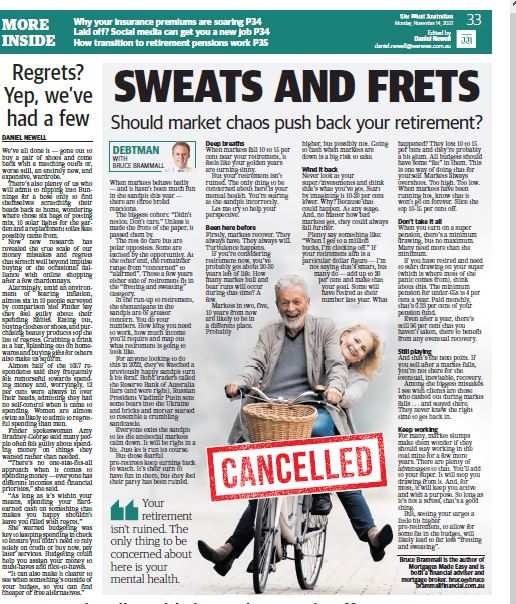
Bruce Brammall, The West Australian, 14 November, 2022When markets behave badly – and it hasn’t been much fun in the sandpit this year – there are three broad reactions.
The biggest cohort: “Didn’t notice. Don’t care.” Unless it made the front of the paper, it passed them by.
The rest do care, but are polar opposites. Some are excited by the opportunity. At the other end, the remainder range from “concerned” to “alarmed”.
Those a few years either side of retirement fit in the “fretting and sweating” category.
In the runup to retirement, the shenanigans in the sandpit are of greater concern. You do your numbers. How long you need to work, how much income you’ll require, map out what retirement is going to look like.
For anyone looking to do this in 2022, they’ve watched a previously happy sandpit turn a bit feral. Bond traders called the RBA liars (and were right), Putin sent some bears into the Ukraine and bricks and mortar started to resemble a crumbling sandcastle.
Everyone exits the sandpit to let the anti-social markets calm down.
It will be right in a bit. Just let it run its course.
But those fearful pre-retirees keep turning back to watch. It’s their turn to have fun in there, but they feel their party has been ruined.
Deep breaths
When markets fall 10-15 per cent near your retirement, it feels like your golden years are turning tinny.
But your retirement isn’t ruined. The only thing to be concerned about here is your mental health. You’re staring at the sandpit wrong.
Let me try to help your perspective.
Been here before
Firstly, markets recover. They always have. They always will. Turbulence happens.
If you’re considering retirement now, you’ve probably got about 20-30 years left of life.
How many market bull and bear runs will occur during that time?
A few.
Markets in two, five, 10 years from now are likely to be in a different place. Probably higher, but possibly not. Going to cash when markets are down is a big risk to take.
Wind it back
Never look at your super/investments and think that’s what you’ve got. Start by imagining it 10-20 per cent lower.
Why? Because that could happen. At any stage. And, no matter how bad markets get, they could always fall further.
Plenty say something like: “When I get to a million bucks, I’m clocking off”.
If your retirement aim is a particular dollar figure – I’m not saying that’s smart, but many do – add up to 20 per cent and make that your goal.
Some will have retired at their number last year. What happened? They lost 10-15 per cent and they’re probably a bit glum.
All budgets should have some “fat” in it. This is one way of doing that for yourself.
Markets always overshoot. Too high. Too low.
When markets have been running hot, know that it won’t go on forever. Slice the top 10-15 per cent off.
Don’t take it all
When you turn on a super pension, there’s a minimum drawing, but no maximum. Many need more than the minimum.
If you have retired and need to start drawing on your super (which is where most of the panic comes from), think about this.
The minimum pension for under 65s is 4 per cent a year. Paid monthly, that’s 0.33 per cent of your pension fund.
Even after a year, there’s still 96 per cent that you haven’t taken, there to benefit from any eventual recovery.
Still playing
And that’s the next point. If you sell after a market falls, you’re not there for the eventual, inevitable, recovery.
Among the biggest mistakes I see with clients are those who cashed out during market falls … and stayed there. They never knew the right time to get back in.
Keep working
For many, market slumps make them wonder if they should stay working in the coal mine for a few more years.
There are plenty of advantages to that. You’ll add to your super. It will stop you drawing from it. And, for most, it will keep you active and with a purpose. (So long as it’s not a stress, that’s a good thing.)
But, setting your target a little bit higher pre-retirement, to allow for some fat in the budget, will likely lead to far less “fretting and sweating”.
Bruce Brammall is the author of Mortgages Made Easy and is both a financial adviser and mortgage broker. E: bruce@brucebrammallfinancial.com.au.